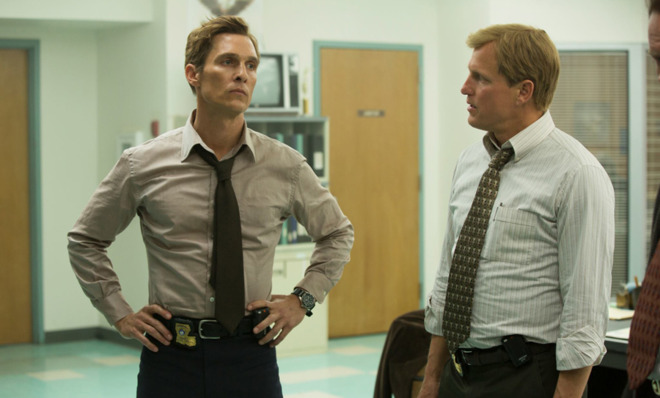True Detective: How HBO broke all the rules of the police procedural
The cable network's terrific new drama is more interested in who solves the crime than who committed it


A free daily email with the biggest news stories of the day – and the best features from TheWeek.com
You are now subscribed
Your newsletter sign-up was successful
Stop me if you've heard this one before. A young woman has been murdered. Her body is discovered in an isolated area, and two mismatched detectives are assigned to investigate. One of the them is an eccentric whose prickly demeanor wouldn't be tolerated if he didn't get results. The other is a by-the-book lawman with a penchant for booze and a troubled marriage. Together, they're drawn deeper and deeper into the strange case as they chase down leads and attempt to determine what really happened.
Any of that sound familiar? That's the basic setup behind HBO's new drama, True Detective, which stars Matthew McConaughey and Woody Harrelson and premieres on Sunday night — and if that's all it was, there would be no reason to watch it. On paper, it's hard to imagine anything we need less than another police procedural on TV. Over the years, we've been inundated with so many cop shows that they can be split off into a seemingly endless string of subgenres. Some are dark. Some are funny. Some are highbrow. Some are lowbrow. Some take an entire season — or longer — to solve a case. Some have a whole new case in every episode.
But for all the variety within the genre, I can't think of any police procedural that has tackled this shopworn material quite like True Detective. The show's uniqueness is built into its DNA: Unlike most TV shows, which use a wide range of writers and directors to tell their stories, every episode of True Detective was written by creator Nic Pizzolatto and directed by Cary Fukunaga. True Detective's story will be over by the end of its first season; if it comes back for a second season, it will follow an entirely different case (though it's not clear whether McConaughey or Harrelson would return).
The Week
Escape your echo chamber. Get the facts behind the news, plus analysis from multiple perspectives.

Sign up for The Week's Free Newsletters
From our morning news briefing to a weekly Good News Newsletter, get the best of The Week delivered directly to your inbox.
From our morning news briefing to a weekly Good News Newsletter, get the best of The Week delivered directly to your inbox.
That closed-ended structure was probably borne out of necessity — a self-contained eight-episode season allows McConaughey and Harrelson to get back to their busy careers as film actors — but it works in True Detective's favor. Anyone who stuck with AMC's The Killing or Showtime's Dexter can attest to how awful a show can get when it goes on longer than its story requires. McConaughey recently described True Detective as "a 450-page film script," and while that's not quite accurate — there are still clear act breaks between episodes — it is about as close as a modern TV show has gotten to approximating film.
True Detective's internal structure is just as audacious. The show freely jumps between 1995, when its central murder investigation happened, and 2012, as both Hart and an almost unrecognizably haggard Cohl reflect on the case. Attentive viewers will be able to puzzle out a few key details about what happened in 1995 by watching the 2012 segments closely, and the murder itself — which seems to have been committed by someone with occult leanings — is perplexing, riveting stuff.
But it's also kind of beside the point. Unlike most procedurals, True Detective is far more interested in the people who solve the murder than the person who committed it. The series spends much of its time with Hart and Cohle as they drive around Louisiana, having long, philosophical conversations about morality. At times, the dialogue is so heightened that it would probably be unintentionally comical if not for McConaughey's stunning performance, which makes a line like, "The world needs bad men. We keep the other bad men from the door," ring with a kind of existential truth that transcends all the old cop-show cliches.
HBO has repeatedly broken new ground in television. The Sopranos deserves much of the credit for sparking our modern wave of antihero dramas, and Game of Thrones continues to push the boundaries of what a TV show can accomplish on a technical level. But there's something uniquely thrilling about True Detective, which shows how much untapped potential — and how much genuine art — can found in one of TV's most overstretched and overplayed genres.
A free daily email with the biggest news stories of the day – and the best features from TheWeek.com
Scott Meslow is the entertainment editor for TheWeek.com. He has written about film and television at publications including The Atlantic, POLITICO Magazine, and Vulture.
-
 6 of the world’s most accessible destinations
6 of the world’s most accessible destinationsThe Week Recommends Experience all of Berlin, Singapore and Sydney
-
 How the FCC’s ‘equal time’ rule works
How the FCC’s ‘equal time’ rule worksIn the Spotlight The law is at the heart of the Colbert-CBS conflict
-
 What is the endgame in the DHS shutdown?
What is the endgame in the DHS shutdown?Today’s Big Question Democrats want to rein in ICE’s immigration crackdown
